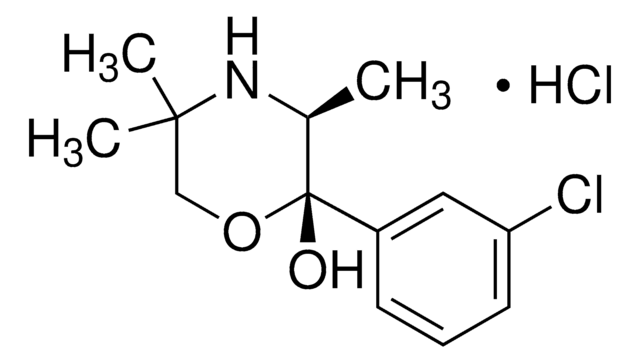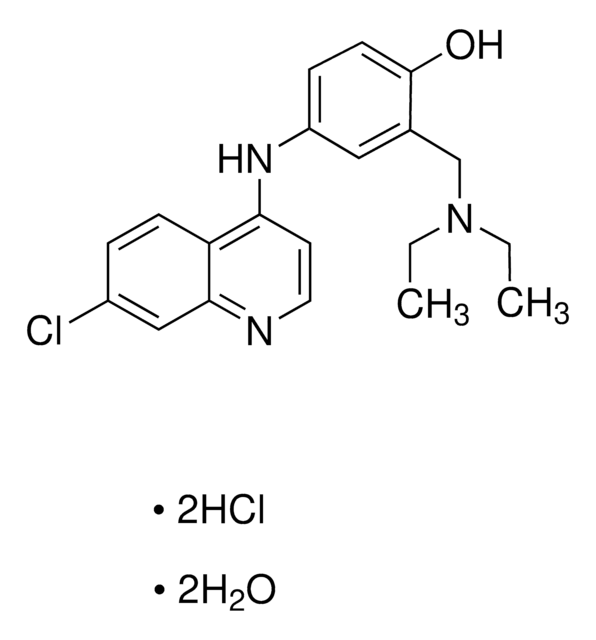SMB00947
N-Desethyl amodiaquine dihydrochloride
≥95%
Synonym(s):
Monodesethylamodiaquine dihydrochloride
Sign Into View Organizational & Contract Pricing
All Photos(1)
About This Item
Empirical Formula (Hill Notation):
C18H18ClN3O · 2HCl
CAS Number:
Molecular Weight:
400.73
UNSPSC Code:
41116107
NACRES:
NA.77
Recommended Products
biological source
synthetic
Quality Level
Assay
≥95%
form
solid
mol wt
400.73 g/mol
technique(s)
HPLC: suitable
color
yellow to dark yellow
solubility
DMSO: soluble
methanol: soluble
water: soluble
storage temp.
2-8°C
Application
Amodiaquine (AQ) is currently used in combination with Artesunate (AS) as first-line treatment for some cases of falciparum malaria (UM) in many countries. AQ is metabolized by hepatic cytochrome P450 2C8 (CYP2C8) to Desethylamodiaquine (DAQ; DEAQ; NADQ; Ndes-amo), which is subsequently eliminated via extra-hepatic biotransformation by CYP1A1 and CYP1B1. DEAQ is responsible for the pharmacological activity of AQ (both therapeutic and toxicity) due to its long elimination half-life.
Metabolomics research
Other Notes
For additional information on our range of Biochemicals, please complete this form.
Storage Class Code
11 - Combustible Solids
WGK
WGK 3
Flash Point(F)
Not applicable
Flash Point(C)
Not applicable
Choose from one of the most recent versions:
Certificates of Analysis (COA)
Lot/Batch Number
Don't see the Right Version?
If you require a particular version, you can look up a specific certificate by the Lot or Batch number.
Already Own This Product?
Find documentation for the products that you have recently purchased in the Document Library.
Yangshun Tang et al.
Toxicology in vitro : an international journal published in association with BIBRA, 62, 104669-104669 (2019-10-20)
Amodiaquine (ADQ), an antimalarial drug used in endemic areas, has been reported to be associated with liver toxicity; however, the mechanism underlying its hepatoxicity remains unclear. In this study, we examined the cytotoxicity of ADQ and its major metabolite N-desethylamodiaquine
Ahmed A Albassam et al.
Saudi pharmaceutical journal : SPJ : the official publication of the Saudi Pharmaceutical Society, 27(3), 406-412 (2019-04-13)
Pterostilbene is a natural polyphenol compound found in small berries that is related to resveratrol, but has better bioavailability and a longer half-life. The purpose of this study was to assess the potential inhibitory effect of pterostilbene on in vitro
Yingshan Han et al.
Journal of medical virology, 91(7), 1182-1190 (2019-02-26)
Studies aimed at repurposing existing drugs revealed that some antimalarial compounds possess anti-Zika virus (anti-ZIKV) activity. Here, we further tested 14 additional antimalarial drugs and their metabolites or analogs for anti-ZIKV activity using a phenotypic screening approach. We identified four
Our team of scientists has experience in all areas of research including Life Science, Material Science, Chemical Synthesis, Chromatography, Analytical and many others.
Contact Technical Service







